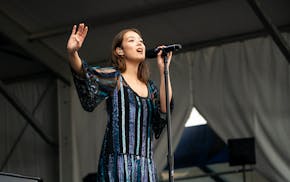The Italians had a lot going on in the 1500s. A century that started with Leonardo da Vinci painting the "Mona Lisa" ended with the invention of opera by a coterie of composers in Venice. Between them came the evolution of a considerably more lowball creation: the theatrical style of commedia dell'arte.
It was theater of the people, often found at street festivals and in humble venues, in which actors both male and female (take that, Shakespeare) would get crowds laughing at ribald, slapstick-laden tales of upper-class young lovers being kept apart by their bickering fathers, but eventually united with the help of crafty servants.
Gioachino Rossini's comic opera "The Barber of Seville" was always rooted in the stock characters and silly scenarios of commedia, but Minnesota Opera's new production really leans into the tradition. It's unapologetically built for laughs, with any earnest romantic yearnings serving only as a palate cleanser before the next madcap twist or trick gone awry. And it's a great deal of fun, the ideal antidote for anyone who imagines opera to be an elitist art form.
That's largely because director Chuck Hudson and conductor Christopher Franklin are so precisely simpatico on the tone they're taking. Rossini's music is full of frothy phrases that fly at you in fleet fashion, the singers often chattering their melodic lines so quickly that they sound like the vocal equivalent of an adrenaline-fueled rocker's drum solo.
Minnesota Opera's opening-night cast handled it all quite impressively, each performer making their cartoonish character engaging company while decked out in Mathew J. LeFebvre's well appointed 18th-century attire and performing on an Allen Moyer set that deftly combines two- and three-dimensional elements.
The plot is pure commedia, the tale taken from Pierre-Augustin Caron de Beaumarchais' comic novel about a barber who facilitates romances, making buffoons of the rich and powerful through clever disguises and fast thinking. For this adventure, he's helping a count capture the heart of Rosina, the ward of a bombastic aristocrat who wants her for his own.
While a second set of leads will perform on May 10 and 18, most audiences will have the opportunity to experience the artistry of a strong opening-night cast. As the barber, Figaro, Takaoki Onishi displayed a fine balance of bravado, charm, comic chops and vocal power. Complementing him well was Lunga Eric Hallam as a charismatic Count Almaviva, whether serenading Rosina with a lovely ballad or joining her for a delightfully well executed second-act love duet.
Katherine Beck was similarly engaging as Rosina, her soprano voice doing delightful things with her arias of love, longing and joy. And Matthew Anchel made for a comically vain and arrogant Dr. Bartolo, aided by Stefan Egerstrom's memorable take on his friend, Don Basilio.
Franklin and the Minnesota Opera Orchestra brought ebullient energy and subtlety to the score of an often not-very-subtle opera, the solos sweet, the rapid romps as thrilling as a roller-coaster ride, especially the sextet that closes the first act and the quintet near the start of the second, both requiring athletic enunciation skills from all the singers.
Like traditional commedia, this production is occasionally a little sophomoric in its bawdiness, but Rossini's marvelous music and the cast's strong execution of it (as well as their well crafted characterizations) make this a very fun night at the opera.
Rob Hubbard can be reached at wordhub@yahoo.com.
Minnesota Opera's 'The Barber of Seville'
When: 7:30 p.m. Thu. and Sat., 2 p.m. Sun., 7:30 p.m. May 17, 2 p.m. May 18.
Where: Ordway Music Theater, 345 Washington St., St. Paul.
Tickets: $25-$263, available at 612-333-6669 or mnopera.org.

Never mind the oldies — here are 10 younger acts to see this summer in Minnesota

Review: Conrad Tao delivers a thrilling Beethoven piano concerto with the Minnesota Orchestra

Gen Z jazz singer Laufey is headed to Target Center on Oct. 11

